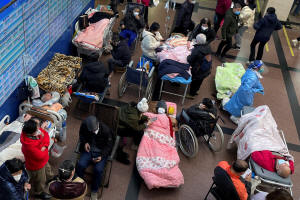China defends its COVID response after WHO, Biden concerns
 Send a link to a friend
Send a link to a friend
 [January 05, 2023]
By Eduardo Baptista and Brenda Goh [January 05, 2023]
By Eduardo Baptista and Brenda Goh
BEIJING/SHANGHAI (Reuters) -China defended on Thursday its handling of
its raging COVID-19 outbreak after U.S. President Joe Biden voiced
concern and the World Health Organisation (WHO) said Beijing was
under-reporting virus deaths.
The WHO's emergencies director, Mike Ryan, said on Wednesday that
Chinese officials were under-representing data on several fronts, some
of the U.N. agency's most critical remarks to date.
China scrapped its stringent COVID controls last month after protests
against them, abandoning a policy that had shielded its 1.4 billion
population from the virus for three years.
China's foreign ministry spokesperson Mao Ning told a regular media
briefing in Beijing that China had transparently and quickly shared
COVID data with the WHO and said China's "epidemic situation is
controllable".
"Facts have proved that China has always, in accordance with the
principles of legality, timeliness, openness and transparency,
maintained close communication and shared relevant information and data
with the WHO in a timely manner," Mao said.
China reported one new COVID death in the mainland for Wednesday,
compared with five a day earlier, bringing its official death toll to
5,259.
Ryan said China's numbers under-represented hospital admissions,
intensive care unit patients and deaths, and said Beijing's definition
of COVID-related deaths was too narrow.
Hours later, U.S. President Joe Biden raised concern about China's
handling of a COVID outbreak that is filling hospitals and overwhelming
some funeral homes.

"They're very sensitive ... when we suggest they haven't been that
forthcoming," Biden told reporters.
The French health minister voiced similar fears, while German Health
Minister Karl Lauterbach voiced concern about a new COVID subvariant
linked to growing U.S. hospitalisations.
CROWDED HOSPITAL
The United States is one of more than a dozen countries that have
imposed restrictions on travellers from China. Germany announced tighter
rules on Thursday.
China, which criticised such border controls, said its border with its
special administrative region of Hong Kong would reopen on Sunday, for
the first time in three years.
Hong Kong's Cathay Pacific Airways said on Thursday it would more than
double flights to mainland China.
Millions of people will travel within China later this month for the
Lunar New Year holiday, an event that the WHO has said could generate
another wave of infections without more higher vaccination rates and
other precautions.
China has played down the severity of the situation. The state-run
Global Times wrote on Wednesday that COVID had peaked in Beijing and
several cities, citing interviews with doctors.
But at a hospital in Shanghai's suburban Qingpu district, patients on
beds lined the corridors of the emergency treatment area and main lobby
on Thursday, most of them elderly and several breathing with oxygen
tanks, a Reuters witness said.

[to top of second column]
|

Patients lie on beds and stretchers in a
hallway in the emergency department of a hospital, amid the
coronavirus disease (COVID-19) outbreak in Shanghai, China January
4, 2023. REUTERS/Staff
 A notice board advised that patients
would have to wait an average of five hours to be seen.
Staff declared one elderly patient dead and pinned a note to the
body on the floor with cause of death "respiratory failure".
Police patrolled outside a nearby crematorium, where mourners
carried wreathes and waited to collect ashes of loved ones.
DATA GAPS
With one of the lowest official COVID death tolls in the world,
China has been routinely accused of under-reporting for political
reasons.
In December, the WHO said it had received no data from China on new
COVID hospitalisations since Beijing's policy U-turn.
In its latest weekly report, the WHO said China reported 218,019 new
weekly COVID cases as of Jan. 1, adding that gaps in data might be
due to authorities struggling to tally cases.
Methods for counting COVID deaths have varied across countries since
the pandemic erupted in the Chinese city of Wuhan in late 2019.
Chinese health officials have said only deaths caused by pneumonia
and respiratory failure in patients who had the virus are classified
as COVID deaths.
Disease experts outside China say its approach misses other widely
recognised types of fatal COVID complications, from blood clots to
heart attacks, sepsis and kidney failure.
International health experts predict at least 1 million COVID-related
deaths in China this year without urgent action. British-based
health data firm Airfinity has estimated about 9,000 people in China
are probably dying each day from COVID.
Surging COVID infections are hurting demand in China's $17 trillion
economy, with a private-sector survey on Thursday showing services
activity shrank in December.
But investors expect China's dismantling of COVID controls will
revive growth that has slid to its lowest rate in nearly half a
century, hopes that lifted Asian equity markets on Thursday.

"China reopening has a big impact ... worldwide," said Joanne Goh,
an investment strategist at DBS Bank in Singapore, saying it would
spur tourism and consumption and ease supply-chain crunches.
An end to China's travel curbs this month is expected to revive
demand in the global luxury retail market, but many consumers now
see more reasons to do their high-end shopping locally.
(Reporting by Liz Lee, Eduardo Baptista and Bernard Orr in Beijing,
Brenda Goh in Shanghai, Tom Westbrook in Singapore, Steve Holland in
Hebron, Kentucky; Writing by John Geddie and Greg Torode; Editing by
Robert Birsel and Raissa Kasolowsky)
[© 2023 Thomson Reuters. All rights
reserved.]This material may not be published,
broadcast, rewritten or redistributed.
Thompson Reuters is solely responsible for this content. |